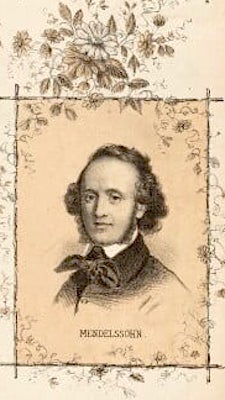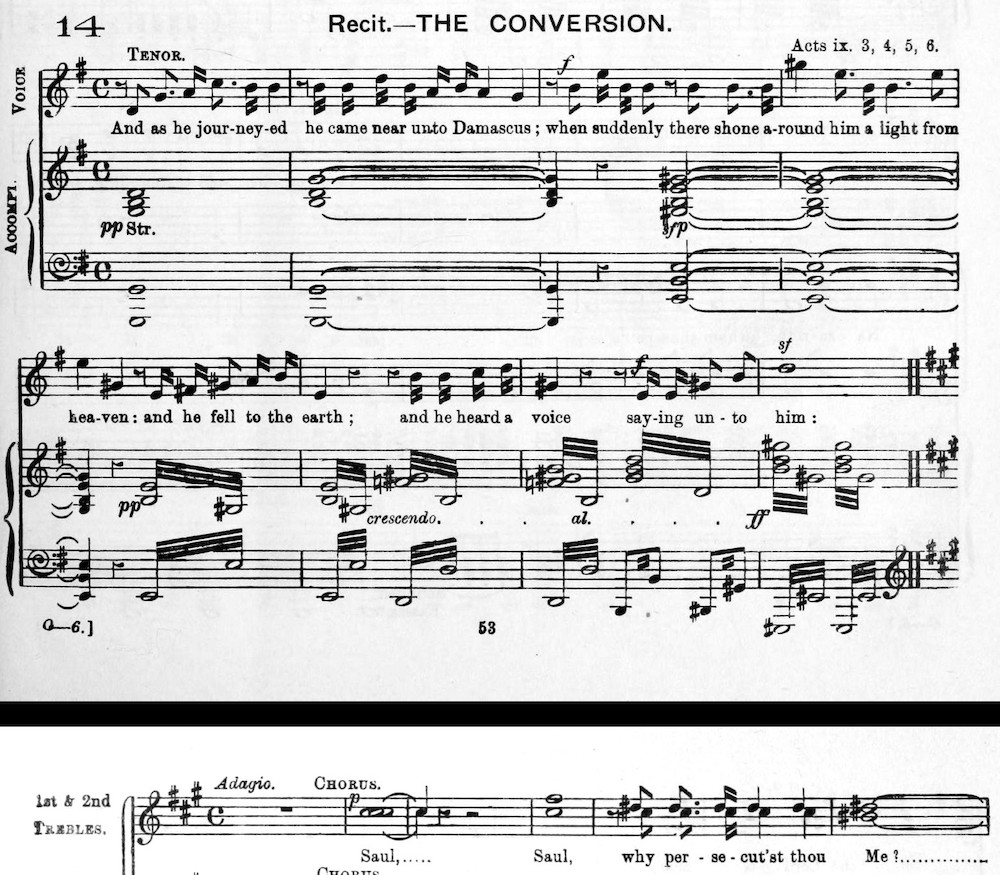A headnote in the Musical Times explains that news of the composer's death on 4 November 1846 came too late for it to be recorded in the previous month's issue. Proudly describing him as "the adopted son of England," the magazine therefore reprinted the following obituary, with permission, from the Atlas newspaper, considering it to be the most "thorough appreciation of his manifold genius and private virtues." Taking our cue from this, we have reproduced it here, adding some illustrations and a sound recording of his well-known "Venetian Boat Song." This replaces the music for a chorus of Mendelssohn's oratorio, St Paul, which was also printed in the issue. — JB

he intelligence received from Leipsic [Leipzig] of the unexpected death of the celebrated Felix Mendelssohn, has spread universal sorrow and commiseration throughout the musical community. It is on first recovering from a blow like the present, when we are enabled to contemplate the void which a man leaves in his art, that we truly appreciate his position and influence. The hand of death is an unerring index to service and desert; it settles all disputes and controversies with the questions — "Where shall we find this man's successor?" "How will music now fare?"

Portrait of Mendelssohn, excerpted from the cover of "Glover's Transcriptions of Classical Gems" © National Portrait Gallery, London, by kind permission.
Fortunately for the fame of Mendelssohn, snatched away in the plenitude of his career, like Mozart, we possess numerous models of the happiest attitudes of his invention. His compositions form an era in the music of the nineteenth century; they have gained for him a permanent and honourable position in the history of the art. In his symphonies, his oratorios, and his pianoforte music, he has sufficiently stamped his own character and individuality; and it is merely a question whether, had it been permitted [153/154] him to multiply these productions in the course of a long life, we should have had that complete transformation in the physiognomy of his works which is essential in a genius of the first class.
Variety like that which distinguishes the com- positions of Beethoven and Mozart, as a series of creations, is a divine attribute of invention. The longer an artist's course, the more severely is he tested by this rigorous necessity, which neither himself nor his hearers can for an instant remove. As age advances and his animal spirits subside — in fact, when he most requires repose — he is constantly required to be more unlike himself and all that have gone before him. This is the formidable difficulty which interposes at every stage a barrier between genius and pretension; to pass it during a life in a regular progression of arduous labours at any time consummates the fame of a composer. The increasing pressure of these trying conditions in the race of fame is so great to the aged composer and artist, that he often either lays by his pen, or labours in vain by deliberate efforts to contend against himself. The calamity which we now deplore, abstracted from its personal considerations, possesses at least one element of consolation, and brings to Mendelssohn favourable prepossession of what he might have done, as well as a tribute to what he has admirably accomplished.
But the personal influence of Mendelssohn on the progress of music, especially in England, cannot be replaced; and that we shall never see him, hear him, or again partake in the enthusiasm which he excited, is our deepest subject of regret. He was the adopted son of England; he repaid our hospitality and friendship by good offices abroad; and was probably the first who opened a regular musical inter-communication between Germany and England. He introduced many of our best singers into the concert rooms of the continent. He understood the genius of our old church composers as well as the merits of our rising musicians; and through him England and Germany were fast amalgamating, and losing in their music the traces of national distinction. His personal qualities and accomplishments gained him that ascendency in English musical society which he employed, in the largest sense, for the good of music.

Excerpt from the sheet music of St. Paul: Oratorio, on the Internet Archive.
In his playing and extemporising he combined all the readiness of the artist of Bach and Handel's day, with the accumulated wonders of execution of the nineteenth century. His training from infancy under [Ludwig] Berger of Berlin, and under [Friedrich] Zelter of the Singing School, had rendered marvels of execution and invention so familiar to him, that he was the sole attraction of every musical society into which he entered. In public concerts he put down all the show players; he triumphed over [Sigismund] Thalberg and his followers with the utmost bonhommie by the mere force of good music. Never shall we forget the triumphant cadence with which he concluded Bach's concerto for three harpsichords, following [Ignaz] Moscheles and Thalberg. He alone knew the style: it was the pedal solo of an organ fugue in double octaves. What gigantic power he put into these things! The beauty of the exhibition, and, indeed, of the numerous demonstrations made by Mendelssohn in honour of Bach, was that he announced himself the disciple of a master contemned by ignorance and prejudice. But with Mendelssohn in the opposition, who would venture to speak against Bach even at the Philharmonic? Here was no uncouth, obscure man — no vulgar enthusiast from the plough, opposing the opinions of elegant society — but a gentleman as cultivated in mind, as polished in manners, as fashionably caressed, and fortunate as could be desired. And yet this man placed all his advantages in one stake for the truth — and whenever propriety and the zeal of judicious advocacy permitted, declared himself for Sebastian Bach. We are filled with affectionate respect for his memory while we record these things. A popular master who sets public opinion at hazard upon a sentiment, and who throws all his trophies at the feet of the composer who realises his ideal and has led him to the sublime, has great influence. Romance like this sways the destiny of the art.
Venetian Boat Song, Op. 19 No. 6, on the Internet Archive. Click on the arrow to hear the song.
We lament more that Mendelssohn's presence, example, opinion, and delightful execution will now be withdrawn, than at the silence of his muse, charming as that was and is. There was a warmth, a gusto, a geniality, in his extemporaneous effusions, which we may not soon hope to reach. In his extempore cadences his countenance flushed with the passion of the moment, and the powers of his hands redoubled with every great occasion. Never since Beethoven took the pianoforte under his protection have such cadences been heard. It was said by a great composer in our hearing that Mendelssohn was compounded of Beethoven and Bach; and admitting a due colouring of his own, the description is just. We could have wished from him more oratorios, more symphonies, more of his delightful choruses to the Greek drama; but most we regret the musical head and prompt fingers that dealt unpremeditated delights on any genial opportunity. First and chiefest we esteem his pianoforte playing, with its amazing elasticity of touch, rapidity, and power; next his scientific and vigorous organ playing. He was the first to disabuse the public of the notion that the arts of playing the organ and pianoforte were incompatible. He himself was a living instance of the perfection of both. His triumphs on these instruments are fresh in public recollection. In private society he displayed more varied powers; [154/159] he extemporised canons with the learned; he played the tenor with quartet players, or combined the songs of ladies at a party in an effective pianoforte fantasia; — often making the two go together. The spectacle of such readiness as this is absolutely necessary from time to time to support the idea of genius which languishes under constantly prepared composition. The poetic fire struck out by collision in an unpremeditated effort has magical power, and no musical performance equals the effect of improvisation which is at once enthusiastic and regular.
We cannot trust ourselves to speak of the memory of the master which retained the stores of an ancient and modern library — and pursued a symphony or an opera on the instant through its minutest details. The elaborate concertos he has played in public give but a faint picture of his faculty of memory. No musician of the present century has equalled Mendelssohn in the variety and perfection of his personal endowments as an artist. This was the active principle of his influence on music, and rendered him in some sort the soul of the art. The respect inspired by such acquirements, by such devotion to an ideal, such intellectual power and modesty of demeanour, elevated the standard of music, and was a constant lesson to the young. "Who being dead yet speaketh" may certainly be affirmed of Mendelssohn during the present generation. What the futurity of music may be it were rash to predict; the want of an idol will not, however, dispose our public hastily to adopt the vagaries of the so-called romantic school. We are secured against that, we trust, by a memorable example of fancy subservient to the strict canons of science.
Mendelssohn's private virtues and friendly qualities are now but too well appreciated in England. He was an earnest lover of nature, and drew inspirations from her scenes. The Hebrides afforded him an overture, and probably the Mer de Glace at Chamouni, for in that solitude we found his name inscribed. From the excitement of perpetual applause, and the tumult of congratulation, we can now imagine how grateful to him must have been an occasional retreat into the silent scenes of nature. Great success has its dangers; and it appears that Mendelssohn, during his late summer residence at Interlachen, in Switzerland, had omens of his impending fate. The sudden decease of a sister, through an attack of paralysis of the brain, deeply affected him. He returned to Leipsic, and expired on the 4th November of a similar attack. Both the brother and the sister shared the same happy endowments: and in this calamity for art we may, perhaps, recognise less an hereditary predisposition to disease, than the effect of constant excitement on the fine organisation of genius.
Note: It has been left to more recent critics to explore more complex issues in Mendelssohn's biography, such as the Jewish background of the Mendelssohn family, and the "physical and psychological toll" on him of his "fragmented life" (Mercer-Taylor 161). Inevitably, Mendelssohn was increasingly caught between the competing demands of performing and composing — and he was an inveterate reviser of his own work — while his public commitments also left him less time to spend with his beloved family. Great achievements are always bought at some expense, even if this goes unrecognised by others at the time. — Jacqueline Banerjee
Links to Related Material
- Music and Social Class in Victorian London
- Musical Royalty: Felix Mendelssohn, the Royal Family, and Popular Musical Appeal in Victorian England
- Felix Mendelssohn and the Nineteenth-Century Musical Scene in Victorian England
Bibliography
Cooper, John Michael. Felix Mendelssohn Bartholdy: A Research and Information Guide, revised and enlarged by Angela R. Mace. London: Routledge, 2010.
"The Late Felix Mendelssohn Bartholdy." From The Musical Times and Singing Class Circular. Vol. 2. No. 4 (1 January 1848): 153-59. Internet Archive, contributed by JSTOR. Web. 11 May 2025.
Mendelssohn, Felix. Venetian Boat Song, Op.19, No.6. Internet Archive, uploaded by Netfocus Universal. Web. 11 May 2025.
Mendelssohn Bartholdy, Felix. St. Paul: Oratorio. London: F. Pitman Hart, (? 192-). Internet Archive, contributed by Brigham Young University. Web. 11 May 2025.
Mercer-Taylor, Peter. The Life of Mendelssohn. Cambridge: Cambridge University Press, 2000.
Created 11 May 2025